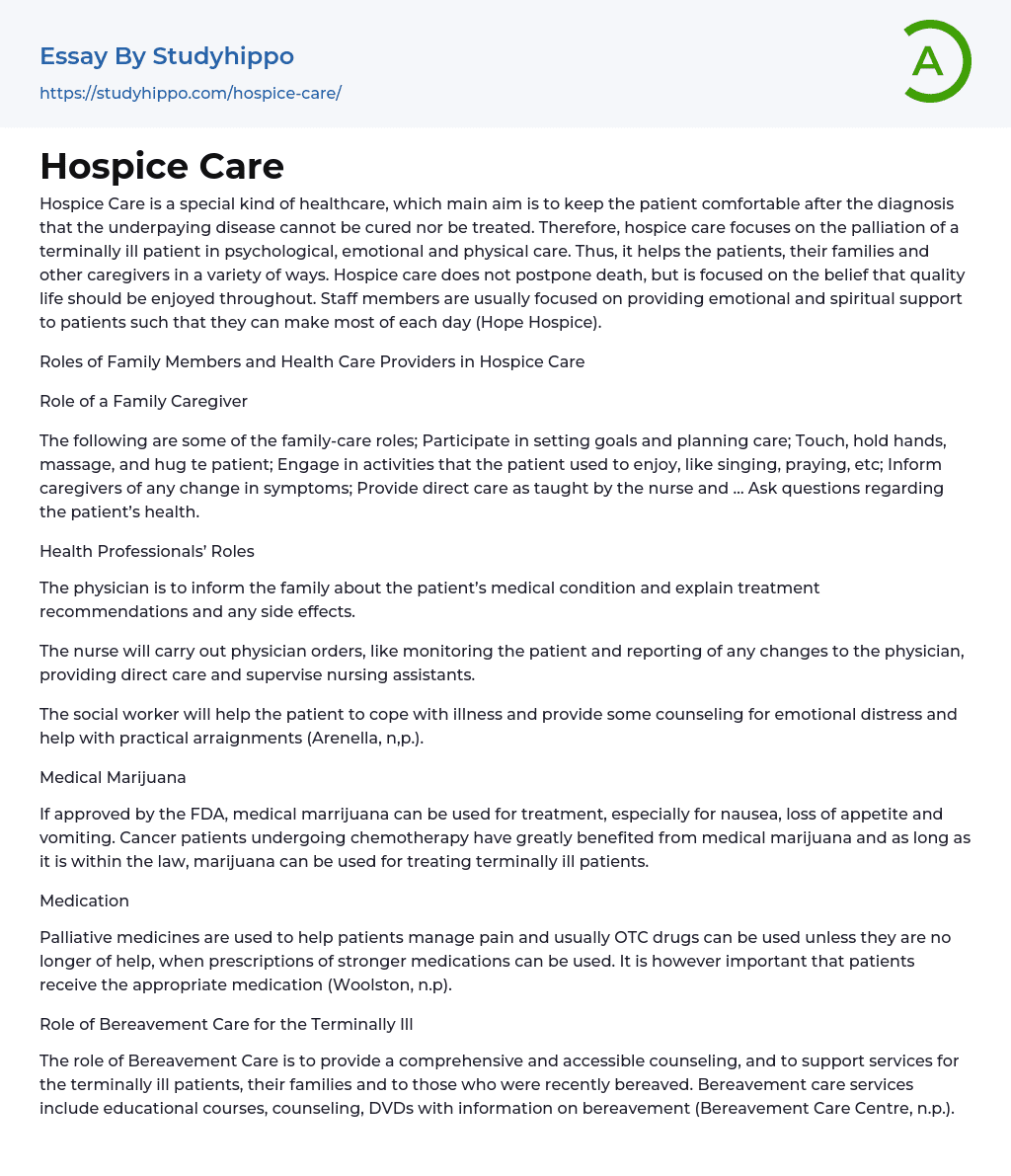Hospice Care is a special kind of healthcare, which main aim is to keep the patient comfortable after the diagnosis that the underpaying disease cannot be cured nor be treated. Therefore, hospice care focuses on the palliation of a terminally ill patient in psychological, emotional and physical care. Thus, it helps the patients, their families and other caregivers in a variety of ways. Hospice care does not postpone death, but is focused on the belief that quality life should be enjoyed throughout. Staff members are usually focused on providing emotional and spiritual support to patients such that they can make most of each day (Hope Hospice).
Roles of Family Members and Health Care Providers in Hospice Care
Role of a Family Caregiver
The following are some of the family-care roles; Participate in setting goals and planning care; Touch, hold hands, massage, and hug te patient; Engage in activities that t
...he patient used to enjoy, like singing, praying, etc; Inform caregivers of any change in symptoms; Provide direct care as taught by the nurse and … Ask questions regarding the patient’s health.
Health Professionals’ Roles
The physician is to inform the family about the patient’s medical condition and explain treatment recommendations and any side effects.
The nurse will carry out physician orders, like monitoring the patient and reporting of any changes to the physician, providing direct care and supervise nursing assistants.
The social worker will help the patient to cope with illness and provide some counseling for emotional distress and help with practical arraignments (Arenella, n,p.).
Medical Marijuana
If approved by the FDA, medical marrijuana can be used for treatment, especially for nausea, loss of appetite and vomiting. Cancer patients undergoing chemotherapy have greatly benefite
from medical marijuana and as long as it is within the law, marijuana can be used for treating terminally ill patients.
Medication
Palliative medicines are used to help patients manage pain and usually OTC drugs can be used unless they are no longer of help, when prescriptions of stronger medications can be used. It is however important that patients receive the appropriate medication (Woolston, n.p).
Role of Bereavement Care for the Terminally Ill
The role of Bereavement Care is to provide a comprehensive and accessible counseling, and to support services for the terminally ill patients, their families and to those who were recently bereaved. Bereavement care services include educational courses, counseling, DVDs with information on bereavement (Bereavement Care Centre, n.p.).
- Emergence essays
- Anxiety Disorder essays
- Post-traumatic Stress Disorder essays
- Hospital essays
- Physician essays
- Health Care Provider essays
- Universal Health Care essays
- Readmission essays
- Cloning essays
- Medical Ethics essays
- Patient essays
- Therapy essays
- drugs essays
- Cannabis essays
- Aspirin essays
- Cardiology essays
- Hemoglobin essays
- Pharmacology essays
- Surgery essays
- alternative medicine essays
- Plastic Surgery essays
- Organ Donation essays
- Vaccines essays
- Medical essays
- Dentist essays
- Psychological Trauma essays
- Physical therapy essays
- Cold essays
- Cocaine essays
- Why Marijuana Should Be Legalized essays
- Drug Abuse essays
- Teenage Drug Abuse essays
- Heart Disease essays
- Artery essays
- Addiction essays
- Anatomy and Physiology essays
- Biodegradation essays
- Cancer essays
- Dental Care essays
- Disability essays
- Disease essays
- Disorders essays
- Health Care essays
- Infectious Disease essays
- Inquiry essays
- Intelligence Quotient essays
- Lung Cancer essays
- Medicine essays
- Neurology essays
- Nutrition essays




